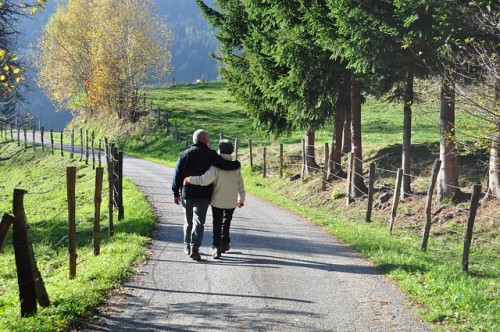“What are all these bags doing in the hallway?”
Defensively I reply, “They’re all my decluttering bags ready to go to the clothing/charity bins at the station.” After years of resistance, I had finally been through my wardrobes and drawers and had a lot to shed. The bags had been lined up at the front door for a few days but had not yet made it into the car and away forever. Trevor looks blank, not impressed. It also includes all the sorting and decluttering we did Genevieve’s room and our old dining room last Sunday, I add (so it’s not just my stuff). Our darling daughter had taken very little when she left home nearly a year ago. “Don’t you remember all the good work we did?” “No”, he doesn’t, he says.
“How long have I had this beard,” he asks stroking his face.
“About six weeks,” I say confused by the question.
“I feel a bit strange. What day is it?”
“It’s Thursday.”
“Do I still go to work?”
“Yes, you do.” This is alarming; what is going on?
I get him to lie down to see if that helps. He says again, “How long have I had this beard?”
“Ever since your operation.”
“What operation?” My alarm bells escalate, “To remove the lump on your thyroid,” I explain tersely.
“Where’s my thyroid?”
Unnerved but not wanting to show it, I take him outside to earth or ground him, or do something to bring him to his senses. He looks fine, walks and talks normally. In fact, he is very relaxed, quiet and calm. He is not perturbed by his questions or my answers. Then I start to ask him some questions in the garden. “What do you remember out here”, I ask. No response, but pointing to the shade cloth frame over one of the veggie beds, he asks, “What’s all this?”
“We made that over Christmas, don’t you remember?”
“No,” he says, and more disturbingly he doesn’t remember our trip to Scotland last year either. This is really hurting me now, that was five months ago, and it was the best trip we have ever had. I press on as calmly as I can. I show him the chook house and the chickens. “Do you recognise our chickens?”, I ask.
“Yes, that’s Baracky and that’s Bumble,” he says slowly, pointing to the two nearest chooks. Halleluiah! He’s right for a moment but then asks again, “What day is it? Do I still go to work? He is on a repeat loop which I realise means no short-term recall memory either.
“Where do you work? I ask him.
“Don’t know, can’t remember. Is it ANZ?” ANZ was over ten years ago. I am trying to quantify the loss but want to keep moving. Swiftly, I take him inside to his computer to see if that will shake him out of it. I ask him to log on to work. He starts but the password fails. We try again. I know he knows, he tells me what it is. He types it in again and it works. Yay! The phone rings. It’s a charity call for Trev. I say it’s a bad time, actually we are having a health crisis, call back another time.
I take stock. It must be a brain injury of some kind – most likely a stroke in its earliest stages before it has hit him physically. It feels like instant Alzheimer’s, but I thought it took years to reach this level. I worked on a stroke project once, developing a new service model for catastrophic stroke patients so I know initial treatment is critical to minimise the damage. I rush to another phone so Trev won’t hear me ringing the GP for an urgent appointment. There is nothing with his own doctor till 4.00 pm. “No”, I say, raising my voice, we must have someone else earlier, or something right now in fact, The receptionist offers me a 12.00 time. “No”, I say again even louder and start to cry. I tell her we can’t wait at all; he has just lost his memory this morning and it might be a stroke.
Hearing my own words, and realising the shocking truth of what is happening, undoes me. She consults the nurse who says go straight to hospital. That’s it! This is the action I was looking for. I rally to get us both ready. As I dress, I try to suppress my lurching sobs and the knowing that our lives will never be the same. I have a glimpse but don’t want to look at a future like this. The phone rings again and it’s my mother. I can’t stop the crying now. I explain that Trevor has just lost his memory, I think he is having a stroke and we are dashing off to Cabrini Emergency Dept. She agrees that it could be a stroke but says it must be a mild one (so calm down) and she will see us at the hospital.
Off we go. I am very protective of Trevor’s state of mind. I don’t want to ask him any more questions he can’t answer, or for him to feel my panic, be alarmed by his lack of remembering or why we are rushing off to hospital. But none of this is an issue for him. He has no anxiety or frustration at all. He seems strangely content to keep asking me the same ‘What day is it?’ set of questions without remembering the answers. While he seems to know he’s lost his memory, as he keeps saying he can’t remember, his immediate operating system is fine. He cautions me not to speed, (thanks Trev), he suggests we park underneath the hospital because it’s a hot day, and yes, he will go inside while I park the car.
He doesn’t actually leave the spot where I left him but he has sat down. I feel his absence. We hold hands and go in together. There is a queue for the triage nurse. I look frantically for another nurse or desk, but the ambulance officer in front of me says there isn’t one. I chat to him to explain my alarm. He totally gets it and says I can go in front of him. He chats to another ambo they both look at Trevor and look concerned. An interpreter is found for the couple in front of me and then it’s our turn. I start to explain about the memory loss/stroke crisis and then lose it completely and can’t talk at all. She looks at me and she looks at Trevor and says, “Who is the patient here?”. I half laugh through my tears and point to Trevor. She tells me to take some deep breaths and starts asking Trev the identity questions – name, date of birth, address, which he answers perfectly. She looks back at me and says it’s okay, it’s not as bad as I think. As if to prove it, she asks Trev to put his arms above his head and to stand up which he does effortlessly. “He has no symptoms, he is not having a stroke”, she assures me, “and he will get better.” She then takes Trev though to the Emergency Department, and sends me off to do the paperwork. As I sit down at the Admissions Desk, Mum arrives, and I do the paperwork. I would have signed anything.
Soon after, we are allowed in to see him. Already he is in a gown with tubes attached to one arm and a blood pressure cuff to the other and there is a TV screen showing his heartbeat blood pressure and other numbers. He smiles and says hi to Bev. He asks how he got here. He can’t remember anything about this morning, or yesterday or any time before that really. A lovely upbeat doctor called Keith comes in and starts testing him – reflexes, pulse, tracking his eye movements et cetera. We chat and explain the whole situation. Then he beams at us. He says he hasn’t had a stroke and he hasn’t got a brain tumour, it’s the most bizarre thing he has ever treated. It’s called TGA – Transient Global Amnesia. He explains that there are no known causes or triggers and no treatment for it. It will pass quite soon, perhaps within six to eight hours, and in the meantime, he will admit Trev into a ward until he recovers. He will also arrange for an MRI, a brain scan to check the remote possibility there is some other cause he can’t detect something, while he is in hospital and a follow-up consult with a neurologist after that.
We are laughing now – TGA is the most marvellous diagnosis. Trevor is already starting to remember things, and we can joke about it. The doctor says he will never remember this morning but gradually the rest of his memory will completely return, and a second recurrence is highly unlikely. Trev wants to go home and Keith says we can go as soon as we like, no need now to be admitted, so we go. What a joyous turnaround – from a near life-changing catastrophe to ‘back to normal’ in a day with no medical intervention! Thank you, Cabrini Hospital, thank you Universe.
It’s been a huge reprieve, a massive a shake-up/wake-up call, but the questions continue. What does it all mean now two days later? Trev thinks ‘it is what it is’ and it will probably never happen again. His memory, short and long term, is intact bar Thursday morning. When pushed further, he thinks maybe he should stop going work a bit earlier than planned. I agree with him but for me, as the witness and near life-changing ‘survivor’, the impact is far greater. The loss would be incalculable for me – the loss of my life partner, father of my children, in-house best friend and golfing buddy. Trev is my rock. Without his memory, his knowledge of all the experiences that have defined him, how he has managed all the stages and relationships of his life and consequently how he sees the world, how could he continue to be Trevor for me? Without his memory, how could he know who he is, or speculate why he is here, and what is his purpose or mission in life? How can you work out the meaning of life if you can’t recall the one you are having? These questions are hard enough for anyone but without access to your primary data, they must be impossible to answer. While this would be an existential crisis for the aware, Trev wouldn’t have the awareness to suffer from this which is a weird type of self-protection I guess. Without any memory of his life and our shared life, my memory of our shared life together and all the family stories and in-jokes that only we can know, would be also be diminished. This concept is profoundly depressing.
Ironically, we are so often urged to forget the past, not worry about the future and just live in the present. Had Trevor not recovered, he would only have the present – there would not be a choice or any discretion to exercise about this. Our experience of the present is so informed by the past and without a consciousness that understands the past and the future, how can we fully appreciate the pleasure of the moment?
It’s distressing also to imagine that the life lessons and wisdom he has gathered from over 60 years on the planet (yet to be articulated and recorded) may have been lost forever. Our children, unborn grandchildren and those beyond may never have known his personal story and his ‘take’ on life from his perspective. This is now a call to action for me. As a life writer and biographer, always encouraging others to record their parents’ or their own life stories and legacies for future generations before its too late, I find I must document ours as a priority. The benefits are exponential. I can even declutter with greater ease and let go of the things I have held on to for so long, knowing there are infinitely better ways to preserve our precious memories than hold on to them in physical form. Trev and the kids will be pleased. Long may this new zeal last, and long may we cherish all who we love, and do what we love doing as if we only had a few years rather than the long decades we expected to have ahead.
Gillian Ednie, Your Biography https://www.yourbiography.com.au/



Follow Us